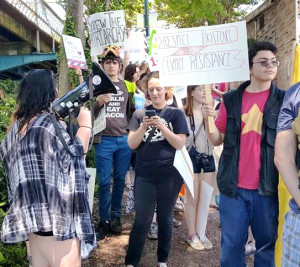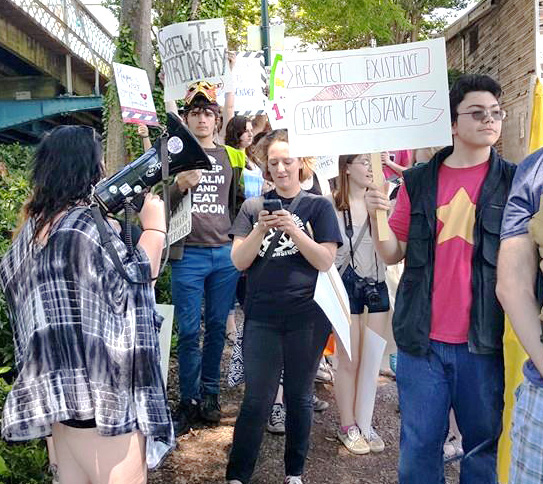Advocacy in every day life

Chattanooga’s 2015 Not Guilty March. Authorities attempted to deter the group from marching through the park, but they continued on, risking further resistance from police. Photo by Abi Burgess.
Advocacy is not always a widespread, radical movement which features picketing crowds and clever posters. Many times, it is simply speaking for someone who cannot. I try my best to be an advocate in my everyday life. Most recently I have found myself advocating for women and for those stricken by poverty.
I am a feminist. What I mean by that is that I believe in the social, political, and economic equality of the sexes. I do not hate men. I do not think women are better than men. There are many different “flavors” of feminism.
I tend to lean more toward person of color feminism, which focuses specifically on bringing women of color to equal standing with everyone else. Advocating for feminism is something that I probably do almost everyday.
I do not put up with sexist jokes or language when I hear it. I break gender roles. I encourage women and men alike to express who they are without consulting how society thinks they should be. This is how I execute advocacy on a day-to-day basis.
Last year, I took part in (and also was the art director/media specialist for) a march titled “Not Guilty.” It was created by a classmate of mine in high school as her senior project, and has continued to take place every May.
The march, which does not only support women, is a protest of rape culture. We made signs and banners and chanted as we marched- we went the whole nine yards. At one point, we were stopped by authorities before marching through a public park. Though we were told we were not allowed, our group continued through the park, disturbing picnics with signs that said such phrases as “don’t hate me ‘cause you can’t penetrate me.” It was a truly thrilling experience.
For my J-Term class this year, I chose a course titled “Action to Advocacy” (taught by the awesome Amy Gilliland). Going into January, I was not quite sure what this class would be like or, truthfully, even what the class was all about. It ended up focusing on the issues of poverty, hunger, and homelessness: what they are and how we can help.
The class was assigned to read “Toxic Charity” by Robert D. Lupton (a really eye-opening book, which I highly suggest if you’re interested in learning more about poverty). During our time in the class, we talked about what kind of charity helped and what kind hurt the poor. As a final, we all presented a PowerPoint on some aspect of poverty, homelessness or hunger and came up with possible solutions.
The class was an extreme wake up call; it made me realize just how lucky and fortunate I am. It also revealed how invisible these issues tend to be. We all participated in several different organizations which help to pacify these issues.
We began at Second Harvest Food Bank, where we packaged cereal to go to hungry people. Our next trip was to Community Food Connection. Here, we put together food packages, cut box tops and handed out the parcels. Our final trip was to Welcome Table. We served dinner to anyone who needed it at New Providence Presbyterian Church. Our class was also meant to also visit KARM (Knoxville Area Rescue Mission), but the snow trapped us in Maryville.
There are so many ways to be an advocate and so many issues that need a voice. If anything, the J-Term class I took taught me to never stop fighting for what I believe in. Once, my dad told me “some things are worth getting arrested for.” Take that as you will, but it reminds me not to just be a passer by. We can all make a difference if we are brave enough.

